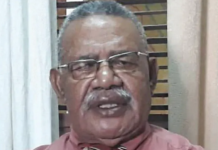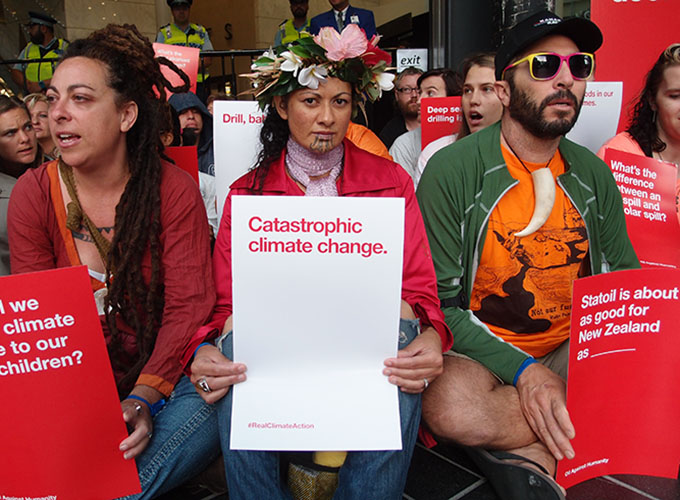
More than 200 people gathered in Auckland this week to protest against the country’s largest oil industry conference, warning that increased attempts at oil exploration will be harmful to both New Zealand and the Pacific. Jihee Junn of Asia-Pacific Journalism reports.
Greenpeace has long experience at non-violent direct action. But this week’s demonstration against policy failure on climate change was the first time in New Zealand the general public have been invited by Greenpeace to take part in civil disobedience en masse.
Environmental activist and main organiser of the event Steve Abel says they were demonstrating as part of a global movement.
![]() Civil disobedience was chosen as a protest method at Auckland’s SkyCity convention centre on Monday in order to convey the seriousness of climate change.
Civil disobedience was chosen as a protest method at Auckland’s SkyCity convention centre on Monday in order to convey the seriousness of climate change.
 “I think when you still have this intransigence on the part of the government and industry to act on this all-important issue, then you need to up the ante,” says Abel.
“I think when you still have this intransigence on the part of the government and industry to act on this all-important issue, then you need to up the ante,” says Abel.
“We operate in that proud tradition of peaceful civil disobedience. For us, the peaceful nature is really important. We’re really about non-violence and peaceful action. Hopefully it has some effect in disrupting the oil conference.”
The protesters demonstrated against an oil conference organised by the Petroleum Explorers and Production Association of New Zealand (PEPANZ), convening leaders in the oil and petroleum industry for the three-day event.
The protesters were part of a Greenpeace-led act of civil disobedience hashtagged #RealClimateAction. Delegates were disrupted from entering the convention centre, some of whom were delayed by more than an hour.
No oil found
“We’ve been protesting the deep sea and off-shore oil drilling for many years now. They so far haven’t found any oil (in New Zealand). It’s been a very successful protest to date,” says Abel.
“But what we’ve got here is a government that’s still hell-bent on drilling for more oil, and it’s the exact oil that we need to leave in the ground if we want to avoid catastrophic climate change.”
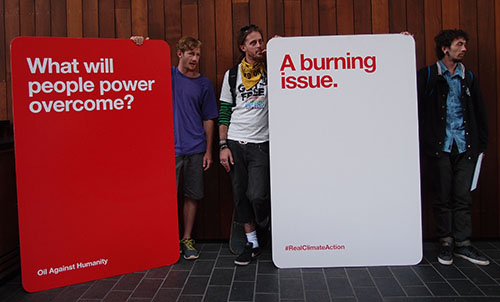
At an early morning briefing hours before the demonstration, protestors were told about the day’s plans.
Organisers split protesters into five groups to block all five entranceways into the conference center.
Two more groups were located inside SkyCity.
The protesters were also briefed on police procedures, discouraging protesters from resisting arrest. They were told that faced with any legal proceedings, Greenpeace would be willing to cover the financial costs, providing the protest protocols were followed.
Protester Perry Wilton believes that if the government is going to engage in deep sea oil drilling, then raising environmental awareness is important.
“I think that this (protest) does that. I think this says that people care and with this stopping people from getting in, it will definitely come up in any discussion that goes on in there.”
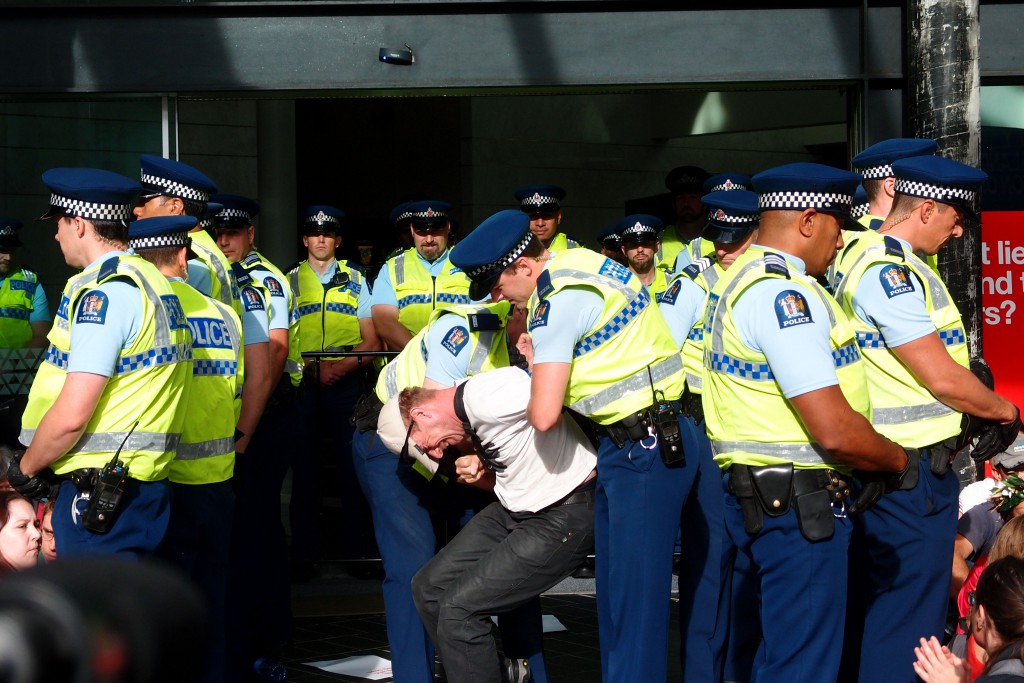
Hottest month
The protests come in the wake of new findings which showed February was the warmest month in recorded history. Scientists are already predicting 2016 to trump last year’s temperatures in being the hottest on record.
The report cited the dangers that climate change was already posing to countries around the world.
In the Pacific, a prolonged and damaging drought in the Marshall Islands has forced the government to declare a state of emergency.
In Indonesia, forest fires have ravaged farmlands, blanketing both the country and its neighbours in a dense screen of smoke and haze.
Professor Richard Betts, head of climate impact research at Exeter University, cites in the report that soaring temperatures caused by rising carbon emissions have caused Indonesia to be turned into a “tinder-box”.
Part of Monday’s action was former Green Party co-leader Jeanette Fitzsimmons. She insists that the climate impacts of deep sea oil drilling would be profound.
“Pacific nations are at the frontline of experiencing the effects of carbon emissions, which are rising sea levels and increasing tropical storms. We know what just happened in Fiji. There’ll be more and more of that and it’ll get worse and worse,” she says.
Going underwater
“Islands like Kiribati and Tuvalu will go underwater and we’re here to tell the petroleum industry: ‘enough’.
“I think New Zealand should be putting all its weight behind alternatives to fossil fuels and assisting Pacific Island nations to develop plans to cope with climate change that’s already underway. We have to be prepared to accept refugees from the Pacific when they have no where else to go.”
Indigenous rights activist Catherine Murupaenga-Ikenn echoes Fitzsimmons’ sentiments.
Having worked with many Pacific human rights advocates, she says that both New Zealand and Australia will have to deal with the impacts of rising sea levels in the region.
“How are we going to accommodate the mass mobilisation — forced mobilisation — of Pacific peoples and others who won’t have any homelands? That’s major. People need to think beyond themselves in terms of wider society.”
Regional leadership
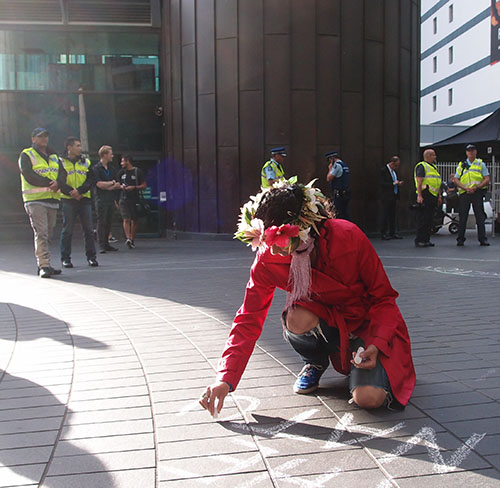
Former executive director of Oxfam NZ Barry Coates also says that New Zealand must do more for the Pacific region.
“New Zealand often draws a distinction between New Zealand and Australia in the sense that Australia visits the Pacific while New Zealand is part of the Pacific. But I don’t think that’s true when that comes to climate change.
“New Zealand relied on the help of Pacific Island countries in order to, for example, get appointed to the UN Security Council. But then it turned its back on the Pacific when it comes to taking on a strong role with regards to emissions reductions, which are obviously important for the future of the Pacific Islands.”
In Paris last year, more than 190 countries signed an agreement to reduce carbon output and keep global warming well below two degrees Celsius. But New Zealand is being accused of skirting many of its international obligations.
“NZ has used climate finance to help some Pacific countries, but the climate finance that is used is really recycled aid,” says Coates.
“Whereas the Copenhagen agreement talked about ‘new and additional’ climate finance which would not be part of aid budgets, what they’ve done is they’ve taken items from their aid budget and called them ‘climate finance’.
“What we’ve seen New Zealand do is to not abide by either the spirit or even the letter of the agreements on climate change that have been made.”
As a protester, Wilton believes that this week’s conference shows the “hypocritical” nature of the New Zealand government despite signing the Paris agreement. He also believes that hosting such conferences for the petroleum industry will only serve to damage the country’s environmentally friendly image.
“New Zealand is expected to lead the global environmental movement. I think people see us as being a 100 percent pure country. I think that it might not only compromise our image but suggest that that isn’t the reality.”
Jihee Junn is a postgraduate journalism student at Auckland University of Technology and is on the Pacific Media Centre’s 2016 Asia-Pacific Journalism Studies course.






























